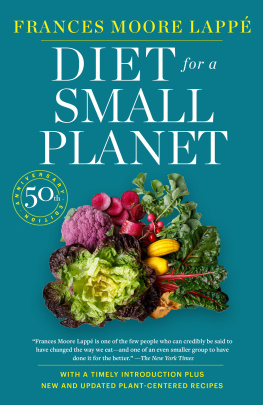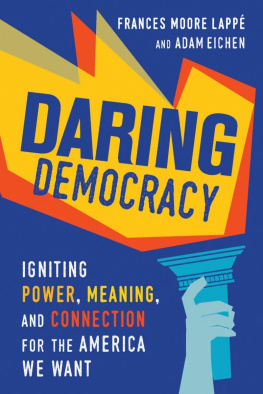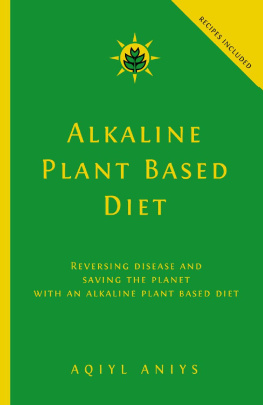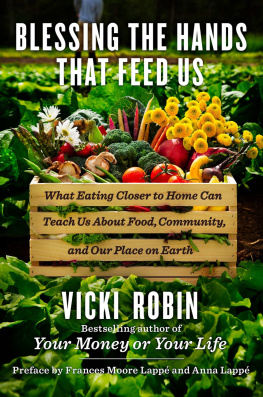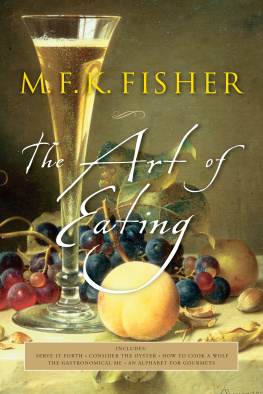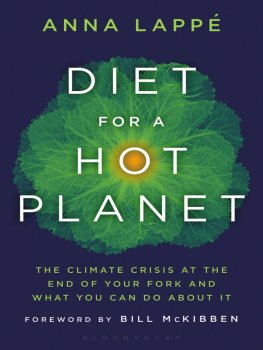Contents
Landmarks
Print Page List
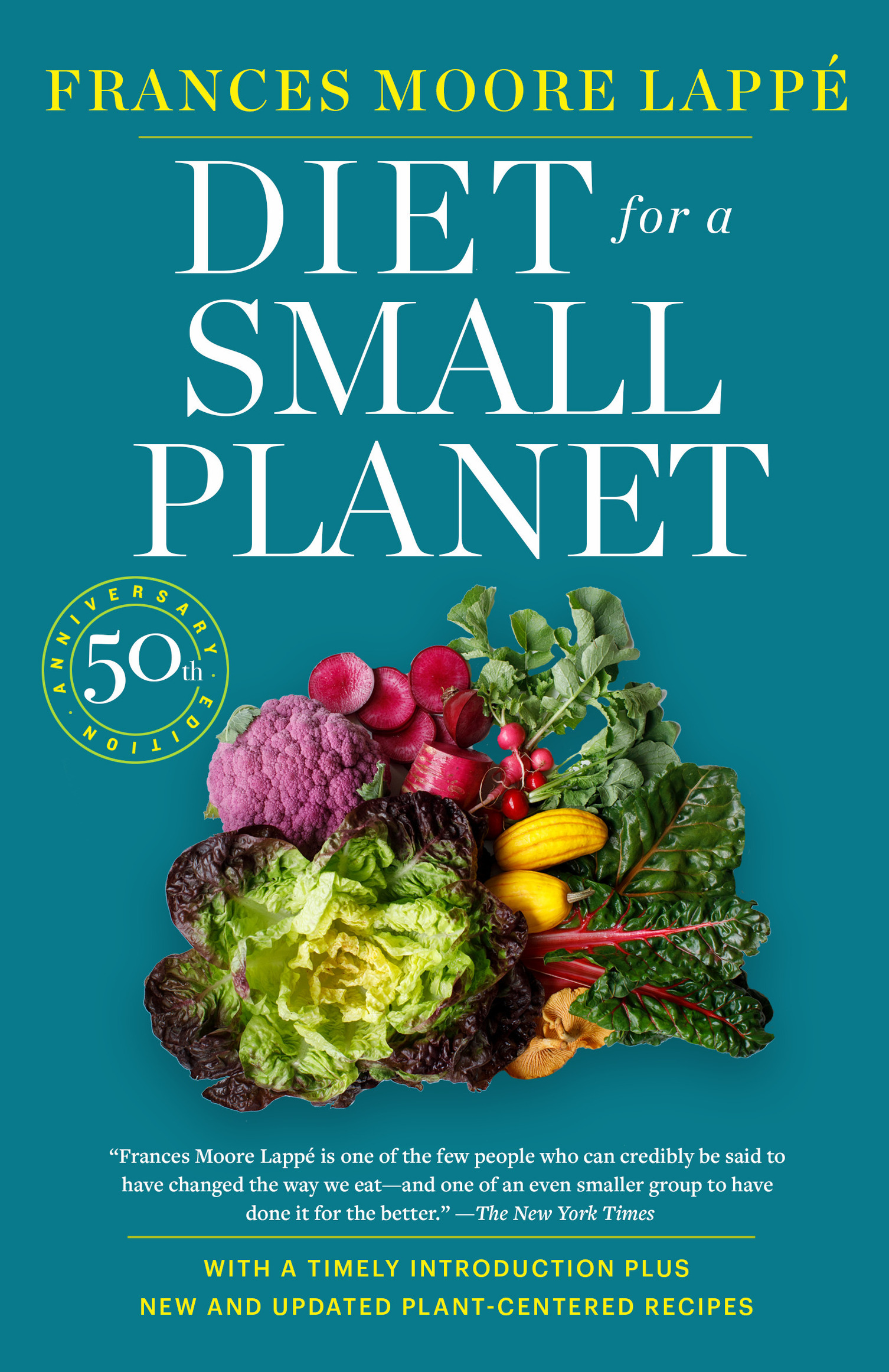
More praise for Diet for a Small Planet
Frances Moore Lapps book [Diet for a Small Planet] about high-protein meatless cooking really contains recipes for revolution.
The Boston Globe
When Lapp wrote Diet for a Small Planet, she changed the lives of an entire generation. Long before anyone was talking about sustainability or climate change, Lapp was doing the math and showing us that the American way of eating was unsustainable. Diet has influenced my food choices ever since then.
Ruth Reichl
Some of the 20th centurys most vibrant activist-thinkers have been American womenMargaret Mead, Jeanette Rankin, Barbara Ward, Dorothy Daywho took it upon themselves to pump life into basic truths. Frances Moore Lapp is among them.
The Washington Post
A foundational book for modern vegetarianism, finally providing a thoroughly argued rationale that did not rely on the cruelty-to-animals argument.
Publishers Weekly
When Frances Moore Lapp wrote the best-selling Diet for a Small Planet back in 1971, she helped start a conversation about the social and environmental impacts of the foods we choose. And, back then, what she had to say was revolutionary. Her idea that a plant-centered diet could be better for the planetand our healththan a meat-centered diet was considered radical.
NPRs Morning Edition
Nearly 50 years ago, Frances Moore Lapps Diet for a Small Planet laid out how we could feed the world by using fewer resources, transporting food more efficiently and streamlining our access to protein and calories by consuming them directly from plants. These ideas have only become more relevant and urgent [today].
Daily News
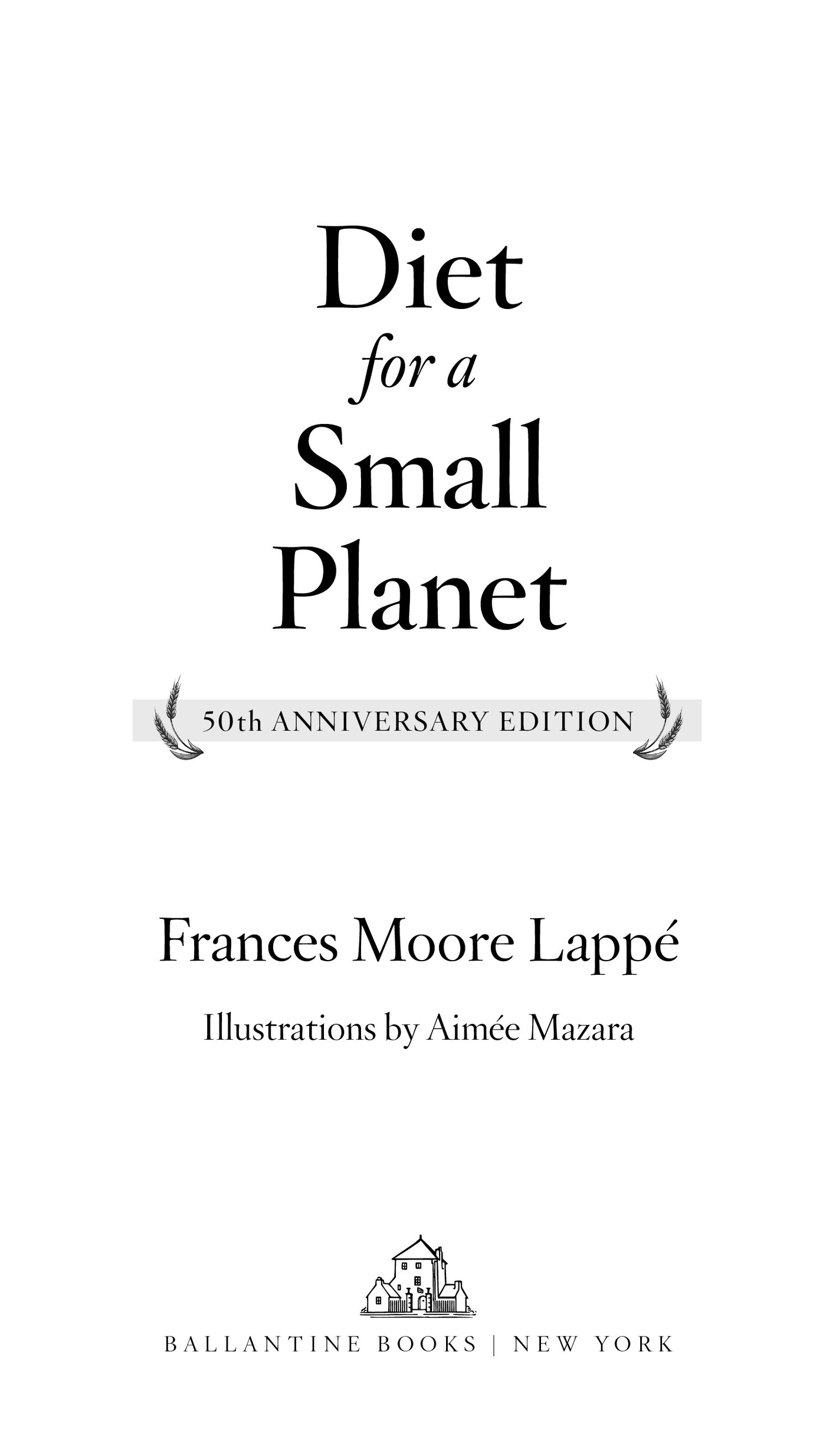
As of the time of initial publication, the URLs displayed in this book link or refer to existing websites on the Internet. Penguin Random House LLC is not responsible for, and should not be deemed to endorse or recommend, any website other than its own or any content available on the Internet (including without limitation at any website, blog page, or information page) that is not created by Penguin Random House.
Copyright 1971, 1975, 1982, 1991, 2021 by Frances Moore Lapp
Illustrations copyright 2021 by Aime Mazara
All rights reserved.
Published in the United States by Ballantine Books, an imprint of Random House, a division of Penguin Random House LLC, New York.
Ballantine and the House colophon are registered trademarks of Penguin Random House LLC.
Originally published in trade paperback in the United States by Ballantine Books, an imprint of Random House, a division of Penguin Random House LLC, in 1971.
Permissions acknowledgments can be found on .
Library of Congress Cataloging-in-Publication Data
Names: Lapp, Frances Moore, author.
Title: Diet for a small planet / Frances Moore Lapp ; illustrations by Aime Mazara.
Description: Revised and updated edition. | New York: Ballantine Group, 2021. | Includes bibliographical references and index.
Identifiers: LCCN 2021000321 (print) | LCCN 2021000322 (ebook) | ISBN 9780593357774 (trade paperback) | ISBN 9780593357781 (ebook)
Subjects: LCSH: Vegetarianism. | Proteins in human nutrition. | Vegetarian cooking.
Classification: LCC TX392 .L27 2021 (print) | LCC TX392 (ebook) | DDC 613.2/62dc23
LC record available at https://lccn.loc.gov/2021000321
LC ebook record available at https://lccn.loc.gov/2021000322
Ebook ISBN9780593357781
randomhousebooks.com
Book design by Susan Turner, adapted for ebook
Cover design: Amy C. King
Cover photograph: Paige Green
Styling by Alysia Andriola
Farms: Pink Barn Farm, Far West Fungi, Beffa Springs Ranch
ep_prh_5.7.1_c0_r0
Contents
Welcome to the 50th anniversary of Diet for a Small Planet. Here, in a new opening chapterOur Choice, Our PowerI share what most keeps me alive in the face of humanitys unprecedented threats. Book One offers a glimpse of history, largely untouched from the original. Book Two, thoroughly revised to todays palate, invites you into the kitchen to experience todays delicious revolution aligning with life. May you delight in learning and eating!
List of Figures
A Protein Factory in Reverse
Calories of Fossil Fuel Expended to Get 1 Calorie of Protein
Amount of Water to Produce 1 Pound of Protein from Various Food Sources
Impact of the Experimental American Diet
Sodium in Fresh Versus Processed Foods
Fiber in 4 Slices of Bread and Other Foods
Control of Our Food by Shared Monopolies
The Price of a Brand Name
Who Owns the Fast Food Giants?
Hypothetical All-Plant-Food Diet (Just to Prove a Point)
Hypothetical Mixed Plant and Dairy Diet (Just to Prove a Point)
Our Choice, Our Power: Introduction to the 50th Anniversary Edition
To see what is in front of ones nose needs a constant struggle.
George Orwell , 1946
I began this journey with the realization that growing and eating plant-centered diets was a great choice. Today it is a no-contest necessity: Either we now make a big turn, or life on Earth as we know it is gone forever.
Whoathis blunt declaration rocks me.
Ill admit its taken me decades to get here, and I am delighted now for this opportunity to share my learning journey with you, dear reader. Youll forgive me, though, if my first thoughts are of my own delight as, over the years, strangers have told me, Your book changed my life.
One story Ill surely never forget is from friend and long-time head of the Berklee College of Music, Roger Brown: I was teaching in a small village in Kenya in 1979 when I came across a tattered version of your book, he told me. I read it on a mountain by moonlight, and it changed the course of my life.
Im still smiling.
When anyone tells me of the books effect on them, I always want to blurt out, Yeah! Me, too. Diet for a Small Planet started as a one-page handout when I was 26, and it has profoundly shaped my lifes quest. Now, on its 50th anniversary, I strive to capture key lessons that help me to this day and that I hope will help you in these challenging times.
Hmm. Challenging doesnt quite do it. Over the past few years, we have been battling the fiercest storm of my lifetime: years of attacks on the integrity of our democracy leading to the first-ever citizens assault on the Capitol, a pandemic deemed the worst in a century, and murders by police that have fueled the Black Lives Matter movementfurthering, we can hope, our nations long-delayed reckoning with systemic racism.
At the same time, our climate crisis nears a tipping point that will drastically hasten destruction. And what first shocked me into actionhunger amid plentyhas gotten worse in recent years, even though the worlds food supply offers one-fifth more calories for each of us than it did 50 years ago.
But in a mighty storm, sometimes the biggest tree comes crashing down, and for the first time we can see its roots. Now is such a storm.
So how do we grasp the roots and use what we discover to pull ourselves back from catastrophe and guide us toward life itself?
The great news is that millions here in the United States and many more around the world are grasping the root causes of our intertwined crises and remaking their lives in ways aligned with what humans and nature need to thrive. Fifty years ago, my youthful ah ha was that food has special power, as every day our very personal food choices connect us to each other and to all of nature. Shock in discovering the needlessness of hunger triggered in me new ways of seeing whats profoundly amiss in our world and our own power to fix it.

